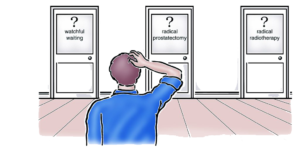Different stages of prostate cancer will require different treatments.
Treating Early Prostate Cancer
What is early prostate cancer and how is it treated?
How is early prostate cancer treated?
Early cancers are usually dealt with in one of three ways:
- Monitoring through active surveillance or watchful waiting ;
- radical prostatectomy; or
- radical radiotherapy or brachytherapy.
Although any one of them may be most appropriate for you, these treatments can have very different effects on your quality of life. So you have an important part to play in making an informed choice.
A number of treatments for prostate cancer, such as cryosurgery, laser therapy and HIFU (high-intensity focused ultrasound), are only available at specialist clinics or as part of a clinical trial. You will be able to speak with your doctor about whether one of these treatments could be a suitable option for your cancer.

What is monitoring?
Some prostate cancers grow slowly and may not affect life expectancy. In this case, it may be best to observe your cancer, rather than begin treatment, to avoid unnecessary treatment and side effects. The two ways of monitoring prostate cancer are active surveillance and watchful waiting. There is a small chance the cancer may grow more quickly than expected but this is unlikely. If the cancer starts to grow or you change your mind about your treatment, your doctor will discuss the available options with you.
What is active surveillance?
Active surveillance involves regular check-ups to monitor your prostate cancer. You will have to go to an outpatients’ clinic or GP surgery for regular PSA tests and sometimes repeat scans, DRE and biopsies. The doctor will be looking for a rise in your PSA level or any change in your condition. Active surveillance is often the best option for those with low-risk prostate cancer.
What is watchful waiting?
Watchful waiting also involves check-ups to monitor the prostate cancer but these do not usually involve DRE and biopsies. It is often the best option for those who won’t benefit from treatment or those whose cancer won’t cause problems during their lifetime.